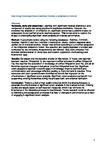Learning from significant medical events: a systematic review
| dc.contributor.author | Price, Tristan | |
| dc.contributor.author | Baines, Rebecca | |
| dc.contributor.author | Marshall, M | |
| dc.contributor.author | Cameron, N | |
| dc.contributor.author | Bryce, Marie | |
| dc.contributor.author | Archer, J | |
| dc.date.accessioned | 2018-09-26T15:19:14Z | |
| dc.date.issued | 2019-08-30 | |
| dc.identifier.issn | 2052-5656 | |
| dc.identifier.uri | http://hdl.handle.net/10026.1/12423 | |
| dc.description.abstract |
Rationale, aims and objectives: Learning from significant medical events is a core component of quality and safety practice in healthcare worldwide and is a key component of efforts to increase the person-centeredness of clinical service. However, the evidence that analysis of, or reflection on, significant events has a positive impact on subsequent doctor performance is relatively sparse. This review aims to explore the impact of undertaking significant event analysis on medical performance. Method: A systematic review using the following databases: PubMed, EMBASE, Medline, PsycINFO and the Cochrane Collaboration Library. Citation searches were carried out on included studies. Impact was defined according to a modified adaptation of the Kirkpatrick evaluation model. The selection and quality appraisal of studies was conducted by 2 reviewers, independently and blinded. Data were extracted from included studies related to: study type and location, population, methodology and intervention type. Results: Six papers met the inclusion criteria for this review. Of these: one reported learners’ reaction (Kirkpatrick 1); 2 reported modified attitudes (modified Kirkpatrick 2a); 5 reported the acquisition of knowledge (modified Kirkpatrick level 2b) and all 6 identified reported changes in behaviour (modified Kirkpatrick level 3a). Significant event analysis is reported to identify gaps in knowledge, improve teamwork and communication and encourage reflection leading to improvements in practice. Time, resources and team dynamics were identified as factors that impacted on the effectiveness of significant event analysis. Significant event analysis may benefit from suspending existing hierarchies during the process itself and external facilitation. Conclusion: There is a lack of high quality evidence within the existing literature to ascertain the effectiveness of significant event analysis in the medical context. Existing studies are largely based on self-reported measures, which may reinforce the importance of the discursive process for practitioners. Future research could be directed at identifying the pedagogical processes that effect changes in performance as a result of engaging in significant event analysis, leading to substantial increase in the person-centeredness of clinical care. | |
| dc.language.iso | en | |
| dc.title | Learning from significant medical events: a systematic review | |
| dc.type | journal-article | |
| plymouth.issue | 2 | |
| plymouth.volume | 7 | |
| plymouth.journal | European Journal for Person Centred Healthcare | |
| dc.identifier.doi | 10.5750/ejpch.v7i2.1637 | |
| plymouth.organisational-group | /Plymouth | |
| plymouth.organisational-group | /Plymouth/Faculty of Health | |
| plymouth.organisational-group | /Plymouth/REF 2021 Researchers by UoA | |
| plymouth.organisational-group | /Plymouth/REF 2021 Researchers by UoA/UoA23 Education | |
| plymouth.organisational-group | /Plymouth/Research Groups | |
| plymouth.organisational-group | /Plymouth/Research Groups/Institute of Health and Community | |
| plymouth.organisational-group | /Plymouth/Users by role | |
| plymouth.organisational-group | /Plymouth/Users by role/Academics | |
| dcterms.dateAccepted | 2018-09-10 | |
| dc.rights.embargodate | 2019-9-13 | |
| dc.identifier.eissn | 2052-5656 | |
| dc.rights.embargoperiod | Not known | |
| rioxxterms.versionofrecord | 10.5750/ejpch.v7i2.1637 | |
| rioxxterms.licenseref.uri | http://www.rioxx.net/licenses/all-rights-reserved | |
| rioxxterms.licenseref.startdate | 2019-08-30 | |
| rioxxterms.type | Journal Article/Review |


